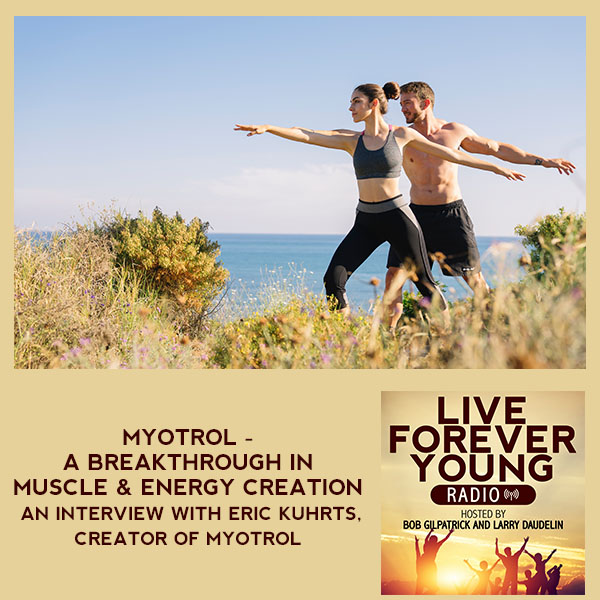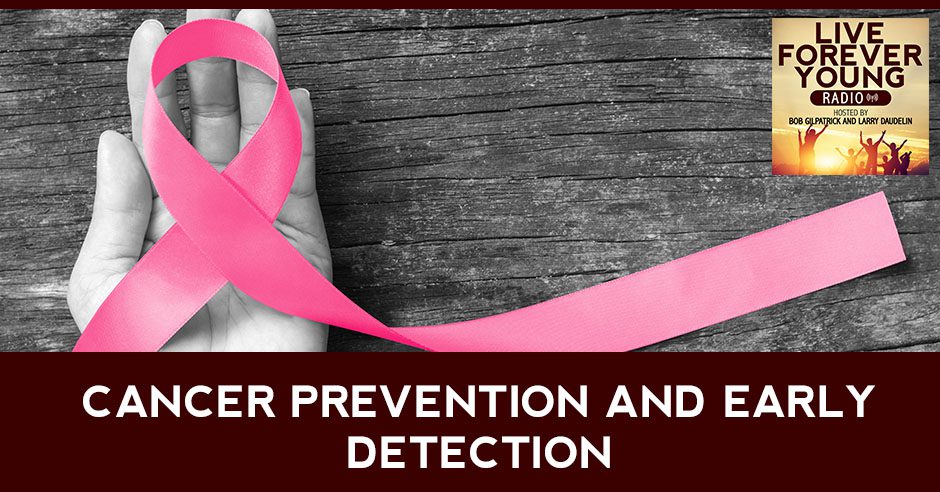
Did you know that over 600,000 people in the U.S. die each year from cancer? The statistics are scary, but there are ways for you to fight it. In this episode, Bob Gilpatrick and Rollie Culp dive deep into cancer prevention and discuss some of the main causes of cancer. They also share tips and simple lifestyle changes you can take to keep your health at its peak. These tips not only help prevent cancer but other disease and conditions with similar risk factors as well. Be informed on the latest in cancer prevention research and stay on top of your health to live forever young.
—
Watch the podcast here
Listen to the podcast here
Cancer Prevention And Early Detection
Is Cancer Preventable?
Did you know that over 600,000 people in the US die each year from cancer? In this episode, Bob and Rollie talk about cancer and the importance of prevention and early detection to avoid developing it. They identify some of the main causes of cancer, some of which might surprise you, the tests to take to find out if you have it and what simple everyday steps you can take to prevent it or keep it from coming back. Inform yourself for your health and get ready to Live Forever Young.
—
Rollie, how are you doing?
I’m good. How are you?
I’m good. We’re going to talk about preventing cancer.
It’s a pretty serious one but it’s something very important. A lot of people I know have at least one person or multiple people in their life that are affected by it. I know there are a lot of people out there who want some information on it and are having a hard time with it.
I’m one of the people who’s affected by it with my family. My dad died from cancer when he was 57. Right around the same age, my sister died from cancer. In the United States, over 600,000 people die from cancer every year. Worldwide, it’s more than ten times up to about fifteen times as many. Instead of 600,000, it’s more like 6 million.
That’s a lot of people.
It’s important to know what you can do to prevent yourself from getting cancer. If you do get cancer and it’s cured of treatment then also what to do to prevent it from coming back?
A lot of people are able to go the first round they knock it out. Either they don’t follow up or the cancer is aggressive and it comes back. That’s a big part of it too, the reoccurrence of it.
One of the main things that we know as a cause of cancer is exposure to toxicity in the environment. The CDC mentions a couple of things in particular that are cancer-causing. One of them is overcooking your meat. We’ve talked about this on other shows. The rule of thumb is never to cook your meat on dry heat over 300 degrees. If you are barbecuing, broiling, baking, frying foods and it’s cooked over 300 degrees, which is almost always the case, the sugar that is in the meat will bump up against the fat in the meat. It creates toxins that are carcinogenic.
When they look at those things under the microscope, scientists look at the carcinogens from meat in particular and they’re like, “Don’t touch that.”
The other one is people leaving their shoes inside the house.
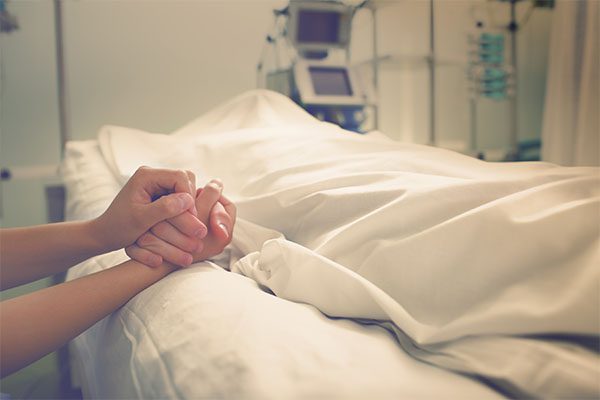
Cancer Prevention: In the United States, over 600,000 people die from cancer every year. Worldwide, it’s more than ten times up to about fifteen times as many.
It’s a weird one. You wouldn’t think that but you’re right. I’ve read that.
People walk around during the day outside primarily and even inside. If you’re inside, you’re walking on a carpet and the carpet has been cleaned with a toxic carpet cleaner. It’s now on your shoes. If you’re walking on the sidewalk, you’re picking up tire dust, fumes from the cars, pesticides that were sprayed on the lawn and trees. You pick those up on your shoes. You bring your shoes inside the house. You take them off and they’re sitting in the hallway at nighttime. They’re off-gassing these toxins and you’re breathing it in all night long.
What you’re saying is there’s a reason why they have those little green stakes that come from whatever company sprayed the lawn. It says, “Stay off the grass for 24 hours.” It’s not just because they don’t want you to go on the grass and they’re being possessive neighbors. There’s a real reason to not go on the grass.
These are the main things that are toxins that can cause it. You also have pesticides in general, which not only can you breathe in but you also can take in from your foods. You want to try and always get organic fruits and vegetables if you can. At the very least, wash your food well before you eat it.
One thing I was going to say is in your local community like in Florida, down here in St. Pete, we have a Saturday morning market. There are a lot of places in the area that have organic food that they bring there and you can buy it in boxes and in bundles. It’s a matter of looking for more resources than just going to the grocery store and looking at your community. If you live in an area that’s rural and you know there are farmers out there, they’re going to have to sell their food. If you can get it directly from that, that’s the best place. All this stuff I get from a small little farm right down in Florida. They bring it to the market every Saturday. They have it all pre-boxed for you because you order it online. That’s the freshest that I can find. I’ve found lots of cool little caterpillars hanging around in there. I’d rather see caterpillars than know that there’s wax holding in the pesticide that was in there. Look for that stuff. It’s out there.
The other thing is fungus has also been implicated in one of the causes of cancer.
There’s a fungus among us.
People are exposed to fungi all the time. They say we live on a mold planet. There are more fungi on this planet than anything else. Some of it is bad for you and carcinogenic. It’s good to be able to constantly cleanse your body of molds because there’s no way to avoid them 100%.
We were talking a little bit about the barley in the barley show we did. The miracle of sprouting, I believe is what it was called. We talked about how you had mold detoxification from the barley and how it stains in your white shirt. You didn’t even realize that until you detox. You don’t know how much you have or have been come in contact with that’s in your skin or in your dermis that could be causing problems.
With all that being said, it is a good thing for people to have a strategy for detoxifying themselves. There’s no way to avoid all the toxins. You’re born with hundreds of toxic chemicals in your body that are environmental that have come into you in the womb through your mom, through poisons in the water, food, air, etc. Moms are constantly exposed and their babies are exposed. You are born toxic and as you age, you get more toxin. You want to be able to get those toxins out on a regular basis.
If you’ve never done detoxing before, you want to be careful and do it slowly because your liver and kidneys have to participate. If you are freeing up or binding up some toxins that are in your cells, you then have to process them out through those organs. You don’t want to overload them and make them all of a sudden all at once. Your kidneys have to know and flush these toxins. Whatever detox you’re going to do, start slow. If you start to feel sick, you’re going to want to stop and then start over again even more slowly.
Make a commitment to a life with little sugar, try to avoid processed foods, and eat real foods. Share on XIf you’re not feeling good, basically what you’re saying is stop, let yourself feel better and then start over. Start at maybe a little less amount than before. Also, probably drink a lot of water.
Drink a lot of water but what you don’t want to do is say, “I’ll just tough it out. I’ll just be sick and they’ll get it done sooner.” That’s not a good idea at all because that means that your kidneys are struggling. You don’t want to do that because you can damage your kidneys if you do it too fast. With our sprouted barley seeds, it’s a very strong detoxifier. For that reason, it comes with instructions on how to start slow. You start out with a small amount each day for the first week then you increase a little bit the next week and a little bit more. This way, the toxins are coming out at a manageable rate then you can begin to increase it so you get the additional benefits of the sprouted barley seeds, the amino acids, the metabolic enzymes, the antioxidant effect. All of these things are also good for helping prevent cancer, particularly the antioxidant effect, which we’ll talk about in a little bit.
The good thing about something like a detoxification process whether it’s our sprouted barley or something is that usually it will help you to get those to a manageable level. It’s not like, “We’re done,” because every day you’re coming in contact with more. You got to remember, it’s an ongoing thing.
It wouldn’t take too long before your body is toxic again. You want to have a maintenance program so that each day you take in toxins and each night you’re releasing them and cleansing them out of your body.
You got to have that balance
The other thing that is good to talk about in regard to prevention is maintaining healthy mitochondria. We’ve done a show on mitochondria.
Yes, we have. Check that out. Go to LiveForeverYoungRadio.com. It’ll give you some good detail on it but how does it relate in this situation?
There is a lot of research and a lot of evidence that cancer is a metabolic type disease where a cell becomes toxic or dysfunctional. The mitochondria, which are the powerhouses of the cell, start to malfunction, which leads to a sequence that the cell then becomes cancerous. You want to take good care of your mitochondria. You want to know how to so go back to that show. In general, you want to make sure about your iron level. A lot of people have high iron levels and they don’t know it. They may go for a blood test and iron is not checked normally. The doctor doesn’t know if you’re high in iron. Even if you do get a test and they say, “It’s fine. You’re in the range.” You want to look at where in the range it is. You don’t want to be at the high end of the range because that will damage your mitochondria.
The iron is damaging your mitochondria because it is interacting with a waste product of your Krebs cycle, the creation of energy cycle that is hydrogen peroxide. The iron connects with it and makes what’s called ROS or Reactive Oxygen Species. That is what damages the mitochondria. You want to make sure that your iron level is just a little below the midway point of that range so you have enough iron for the metabolic pathways it’s involved in, particularly, the delivery of oxygen to your cells. You certainly don’t want to have too much because that’s even worse than having too little iron. That’s one of the main things that damage mitochondria.
It’s too much iron. Iron levels, check them.
The other whole thing is watching your diet. The main thing is to not consume too much sugar.
It’s in everything so you got to watch.
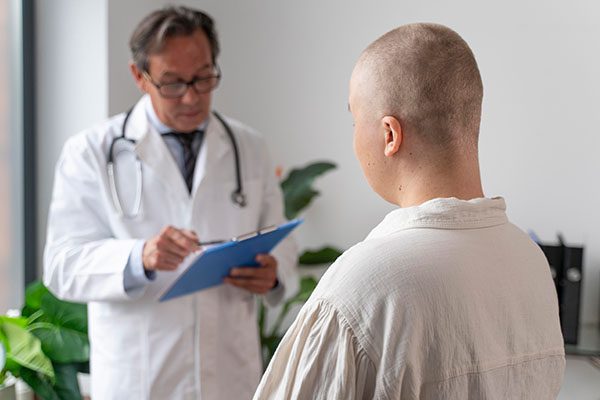
Cancer Prevention: You want to have a maintenance program so that each day you take in toxins, and each night you’re releasing them and cleansing them out of your body.
There’s a good book called the Sugar Impact Diet by JJ Virgin. It’s a book that shows you where all the hidden sugars are. Very few people have a bag of sugar and they are eating it by the spoonful. Sugar is in foods and then sugary drinks, soda pops and energy drinks have lots of sugar in it.
There are carbohydrates too.
The sugary drinks, the data is showing still that about 25% of all the calories in America is being consumed by drinking soda pop. Thus, you have 600,000 people in the United States dying from cancer each year. You want to make sure you have the Sugar Impact Diet and make a commitment to a life with little sugar. Also, try to avoid processed foods and eat real foods like you were saying from the farmer’s market, good, fresh whole foods that are organic.
I’ve also heard the keto diet is very good. Keto diet is something good to follow because of the fact that it’s helping you burn a lot of the fat for fuel.
The keto diet is more healthy fats and fewer carbohydrates. It has been shown through studies to be great assistance in preventing cancer. You also have a whole issue of trying to consume foods that are anti-angiogenic. Angiogenesis is the creation of new arteries that will supply sugar via the bloodstream to a cancer cell. If you have cells that have metabolic damage like the mitochondria, they begin to become cancerous. That cancer cell will send a call for the blood supply. You’ll create a new artery. They’ll come and feed the cancer cell and it’s feeding it sugar. That’s called angiogenesis. What you want to do is consume foods that are known to block that angiogenesis.
You don’t want a lifeline going into the cell in the form of a vessel.
You’re looking at strawberries, green tea, red grapes and artichokes. They are all really good.
I heard the kale too for that.
Kale is good, just don’t eat a lot of it raw.
We talked about steaming the veggies.
You don’t want to eat a lot of cruciferous vegetables raw because of an acid that can damage your thyroid.
On Detox: If you're not feeling good, stop, let yourself feel better and then start over. Share on XIn the last show we did, What’s What With Leaky Gut?, we talked about how you want to avoid eating the vegetables raw because it causes that acid and issues with that. What you want to do is steam them.
If you steam them very lightly, you’ll get rid of most of that acid. You can then go ahead and juice them or eat them with good grass-fed organic butter. Another thing that specifically we want to talk about is inflammation in general. Inflammation has a direct correlation with cancer. It’s not just inflammation in the mitochondria from the iron. Generalized inflammation is something that you want to keep down as much as possible.
We talk a lot about it in all of our shows. How many things are caused simply by having too much of this inflammation in the body?
We have a whole show just on inflammation. In general, you want to make sure that you’re not consuming foods that create inflammation, which are foods that raise your blood sugar. Foods that raise your blood sugar leave excess sugar in your blood. It pumps up against proteins in your blood, which are good proteins for building things. The sugar damages it and creates a toxin that is carcinogenic. It also has a result of throwing off a superoxide molecule, which is highly volatile and damages your body and is a contributing factor to cancer. It raises a blood test called C-reactive protein, which is your measure of inflammation. The rule of thumb is you want yours to be below 0.5. It’s a good number that is indicative of preventing cancer.
It’s a measure of the level of inflammation in your body.
By keeping it low, you won’t have these pathways that are damaging your cells, mitochondria, etc. You can keep your inflammation low by watching your diet and also consuming anti-inflammatory nutrients. We talked about the sprouted barley seeds as superoxide dismutase. The Boomer Boost product that we have contains vitamins A, C, E and minerals like selenium, zinc, glutathione, trimethylglycine and proanthocyanidins. All of these together can reduce inflammation as we see with the people that use our products. Their inflammation might be at a level 5 or a level 3. As they go through a couple of months, inflammation comes down to 0.3 or 0.5, sometimes even below points 0.1.
The thing about inflammation that makes a difference is it also contributes to the aging factor. You’re making less of the antioxidants naturally as you age. Therefore you need to supplement somehow and that would be through high foods with antioxidants. A good supplement that can pull that inflammation out will help to slow the aging process and at the same time help with the prevention of cancer and angiogenesis.
Cancer is also related to age. The older you get, the more likely you are to get cancer. That partly relates to the fact that you’re accumulating toxins but you also are making fewer antioxidants. You’re aging faster as you get older. You’re increasing your risk for cancer as you get older unless you pay attention, follow along with what we’re talking about and take your antioxidants.
There was a book you had mentioned before we started talking about doing the show, Cancer Free! Are You Sure?
Cancer Free. Are You Sure? by Jenny Hrbacek. She is a registered nurse who was a survivor of cancer. Cancer also recurred and she didn’t know that she was having a recurrence until it was pretty far along. She endeavored to write a book to help people that have had cancer and want to make sure it doesn’t come back. She talks about a test that’s an anti-malignancy, antibody test, a circulating tumor test. There are numerous tests she talks about in the book. There are different ones for different types of cancer. She also talks about a lot of the things we’re talking about here. I got to meet Jenny at a cancer conference that was put on by Joseph Mercola and other physicians that came and people like Jenny. I got to meet her and get one of her books. It’s an important book to have. It’s not only for a recurrence of cancer but just in general. You can get those tests done for yourself, even if you never have cancer.
One of the things that we were talking about as far as prevention but we haven’t touched on is the exercise factor.
Exercise is important by itself for preventing cancer because it increases your circulation, which is important. It also helps you keep your ideal body weight. That’s another issue. Obesity, which usually is associated with consuming too many carbohydrates and sugars, has a direct correlation to your risk for cancer. Exercise is an extremely effective way to help prevent cancer. You want to try to do aerobic exercise 2 or 3 times a week and do some strength training exercises as well. We’ve had David Spinelli on before where we were talking about exercise.
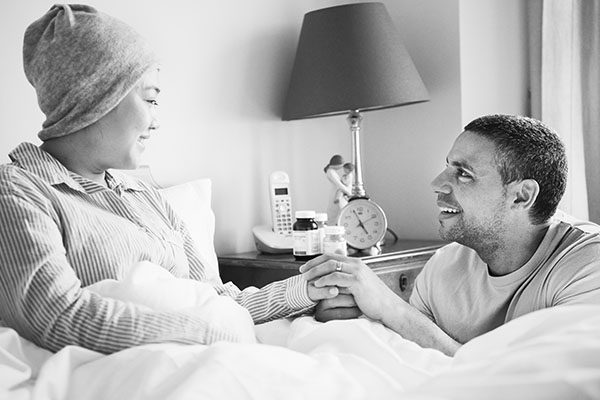
Cancer Prevention: The good news is that paying attention to antioxidants, diet, circulation, inflammation level, all help to prevent both Alzheimer’s and heart disease in addition to cancers.
All Things Fitness is the name of the show.
It’s a good show. The last thing is this, we know from research that if someone gets cancer, particularly breast cancer and they survive the breast cancer. They have a much higher chance of dying of other diseases later on such as heart disease and Alzheimer’s disease. This is not surprising since we know that high inflammation can be a cause of cancer, poor diet and all the things we’re talking about. They also are causes of Alzheimer’s and heart disease.
The good news is that paying attention to antioxidants, diet, circulation, inflammation levels, all help to prevent both Alzheimer’s and heart disease also. You don’t have to do anything different to prevent heart disease and Alzheimer’s disease. You just need to follow along with what we’re talking about for preventing cancer, these good habits and bits of information about avoiding toxins with your shoes inside the house and all that. Having all that toxicity in your body creates more inflammation. More inflammation damages your heart and also your brain. Follow along with these and prevent the early onset of other diseases if you are a cancer survivor.
That’s one of the things. That’s why we felt it was important because we knew that not only did the statistics say it but there are plenty of people that I know. Unfortunately, my aunt got diagnosed with throat cancer. Luckily they caught it early. She’s 82 right now. She said she had a sore throat and it wasn’t going away. She went into the doctor for something and they were checking it out. They found this little lump here but she pays attention. She’s 82 for a reason and she’s in really good health. This is the first time she was ever in the hospital for anything other than some routine thing. It goes to show you that early detection helps to prevent as well as following a good and healthy diet and being reasonable. Don’t eat sugars.
Make sure your aunt has a good supply of Gladiator Barley and Boomer Boost.
I already sent her some. I called her to see if she needed more.
Vitamin D as well. Low vitamin D levels are correlated with cancer. You want to make sure your level is up there around 70. We can give people that vitamin D in a total health system that comes with the barley and Boomer Boost. It also gives you some extra Omega-3 and the D3 for free. Rollie, I think that’s about it. That covers the major issues.
There are a lot of things to go over but you couldn’t cram it all into one show but we went over a lot. Check out the other shows we were talking about. You can get up on the mitochondrial thing and what we were talking about with inflammation. That’s one of our earlier shows.
Exercise as well. Rollie, thanks for joining us.
Thank you for joining us too.
Thanks. We’ll see you at the next show.
Important Links:
- show – past episode
- Sugar Impact Diet
- What’s What With Leaky Gut? – past episode
- inflammation – Inflammation And Your Health episode
- Cancer Free! Are You Sure?
- All Things Fitness – past episode




